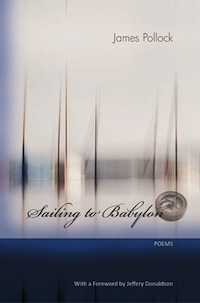Book Review
James Pollock, Sailing to Babylon, Able Muse Press, 2012
by Richard Merelman
James Pollock has written a highly accomplished volume that demonstrates technical mastery, erudition (without pomposity), a meditative lyric sensibility, and easy accessibility. He situates a wide range of subjects immediately in his titles, and connects his poems to major forebears and traditions. A lengthy concluding poem, “Quarry Park,” follows Dante, in its deceptively effortless terza rima.
The technical strengths of the volume lie in its unobtrusive iambic meter (which dominates the poems); its skillful stanzas—often couplets—; its marvelous use of slant rhyme (see “Prow,” for example); its elevated but not exaggerated diction; its occasional uncommon form (such as the rondel supreme of “Sailing to Babylon”); and its sharply observed details, reminiscent of the late Seamus Heaney. There is also a healthy impulse to connect the work to earlier poets and traditions: the Yeats of “Sailing to Byzantium,”; the Romanticism of Wordsworth; and even the John Ashbery of “The Picture of Little J. A. in a Prospect of Flowers” (“The Poet at Seven”).
No single poem or excerpt can capture the essence of Pollock’s aesthetic. However, the opening stanzas of “Ex Patria” provides a good sample of the book’s style and theme:
Some nights I stand before my bookcase,
touching the spines. The household gods
are murmuring in their sleep.
At last I take a volume,
open its paper cover
like a hatch, and my mind climbs down
to the half-remembered
country I have left:
The country to which Pollock refers is Canada, which provides the historical settings for several of his poems. These stanzas display the meditative pace that characterizes many of the poems. The lines also demonstrate Pollock’s tendency to approach his subjects indirectly, through media other than his own authorial voice. In this case, a book becomes the medium. Elsewhere it is personae (Glenn Gould and Northrop Frye); explorers; mapmakers; mimes; even archeological relics (such as a ship’s figurehead in the British Museum). Pollock is a poet of understatement; he puts the poem before the poet.
The admirable thematic unity of the volume lies in journeys —quests by a Canadian expatriate to re-locate himself in time and space. Interestingly, however, for a volume devoted to a theme of movement, exploration, discovery—whether through archeology; geography; social history; myth and religion (“Quarry Park”); or apparently personal events—little personal transformation seems to occur. The author is often carried along by others, or by circumstances over which he has little control, or by expeditions, which either fail brutally (cannibalism in one “Northwest Passage” after Cavafy) or are abandoned (Henry Hudson in a second “Northwest Passage” later in the volume). The result is a certain reticence which will engage some readers and distance others.
Let me offer two quite different examples of these tendencies. The first section of the book consists of six poems seemingly drawn from personal experience. “The Poet at Seven” pictures the author in the third person listening to a beloved teacher read “The Odyssey”: He writes:
…if only he could wait like that
forever while Miss Harmon reads The Odyssey
(his kind young teacher with the ringing voice
he loves so much he lets the story sing
into his heart), she would peal out for him,
It is true, of course, that the poem concerns a boy of seven, who can hardly be expected to act as an agent of his own destiny. Yet how strongly he wishes for his teacher to speak in his place.
A second example is the poem “Sailing to Babylon,” which I’ll quote in its
entirety:
I sailed a boat to Babylon
and rowed back lonely in the rain.
I struck out down a country lane,
I set my course for Avalon,
but once I’d crossed the Acheron
and slept beside the silver Seine,
I sailed my boat to Babylon
and rowed back lonely in the rain.
I’ve worshipped at the Parthenon,
I’ve loved the girls of Aquitaine,
but when they lay my bones in Spain,
O tell the Tetragrammaton
I sailed my boat to Babylon
and rowed back lonely in the rain.
The use of place names, mythology, form, and repetition make this poem a natural title-piece for the volume. Examined closely, it consists of a series of excursions in which the distinctive qualities of successive destinations are rejected. The poet rows first to Babylon, a city usually associated with wealth and vice. These the poet rejects.
Next he crosses the Acheron—the mythical Greek river of pain—and reaches the Seine, a symbol of beauty and pleasure. Here he rests; but the Seine also disappoints, and again he sails away. Next, he seeks classical inspiration at the Parthenon, and sexual pleasure in Aquitaine. They also do not suffice. So only God (the Tetragrammaton of death) remains.
Ultimately, the author has traveled far on the page, but arrives where he began.
Accepting limitations, even stasis, is a perfectly valid “message” for a poem. However, some readers might prefer an indication of personal struggle or even transformation. Of course, there is an inherently subjective dimension to every interpretation of a poem, including this interpretation.
There is real vitality in some of these poems, chiefly delivered via shifts in meter and diction, such as the fragmented lines in “Mortgage” and the conversational narrative in “Glen Gould on the Telephone.” But “Quarry Park”—the longest poem—seems to prefer the beautiful ruins of past ages to the vital, if clamorous, present. In this respect, "Quarry Park" is a fitting conclusion to “Sailing to Babylon,” an understated and elegant collection of thoughtful poems.
Richard Merelman writes poems because language is the only medium through which he can hope to achieve beautiful expression. Poems of his have appeared in Main Street Rag and Measure. Recent poems have appear in Bumble Jacket Miscellany and Verse Wisconsin. He taught political science at the University of Wisconsin, Madison until 2001. His volume poems, 'The Imaginary Baritone," was published in 2012 by Fireweed Press.


